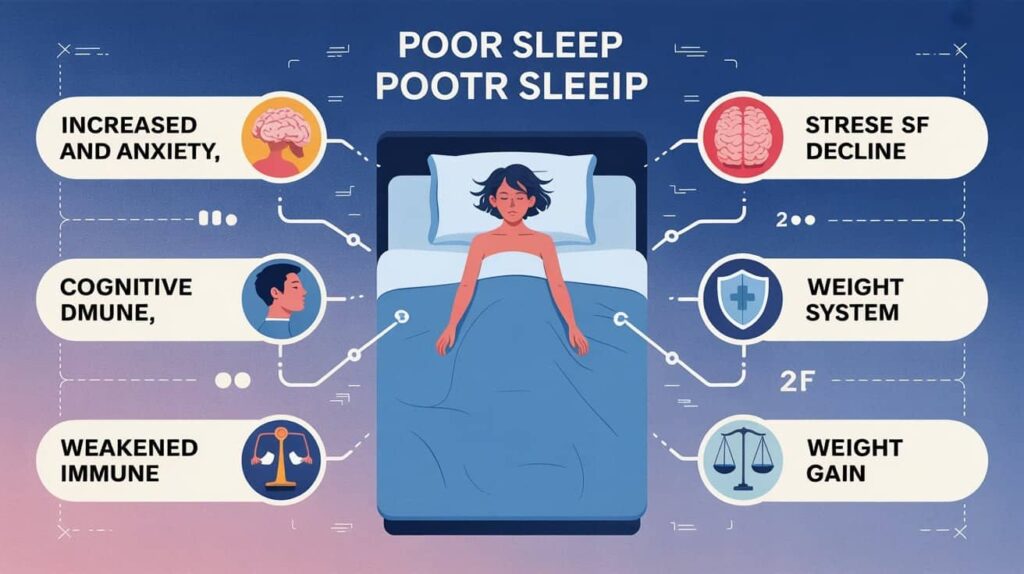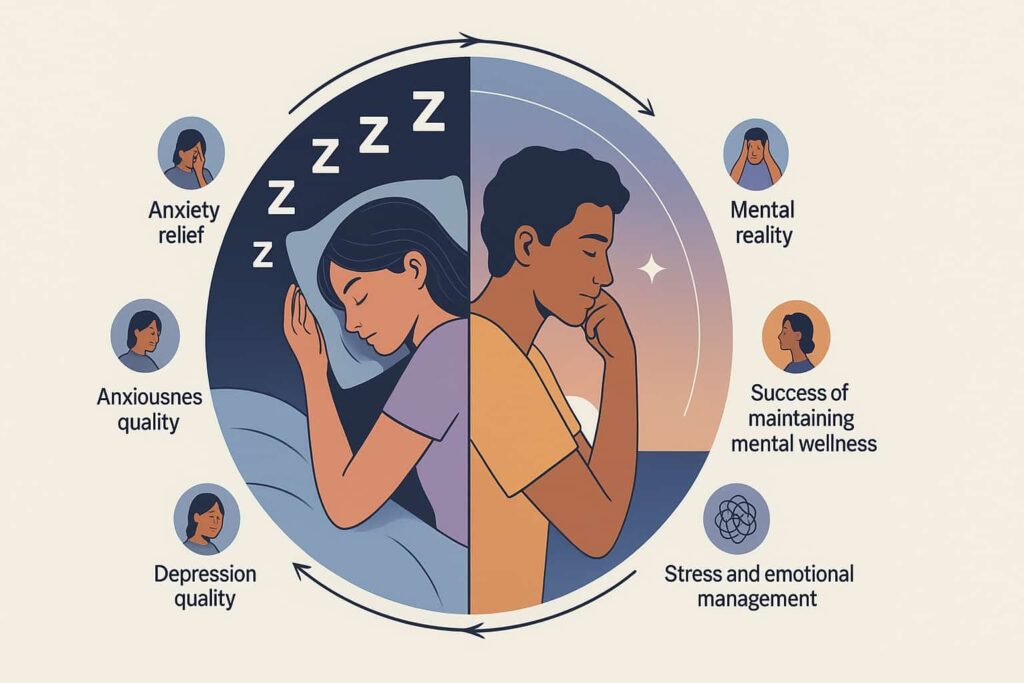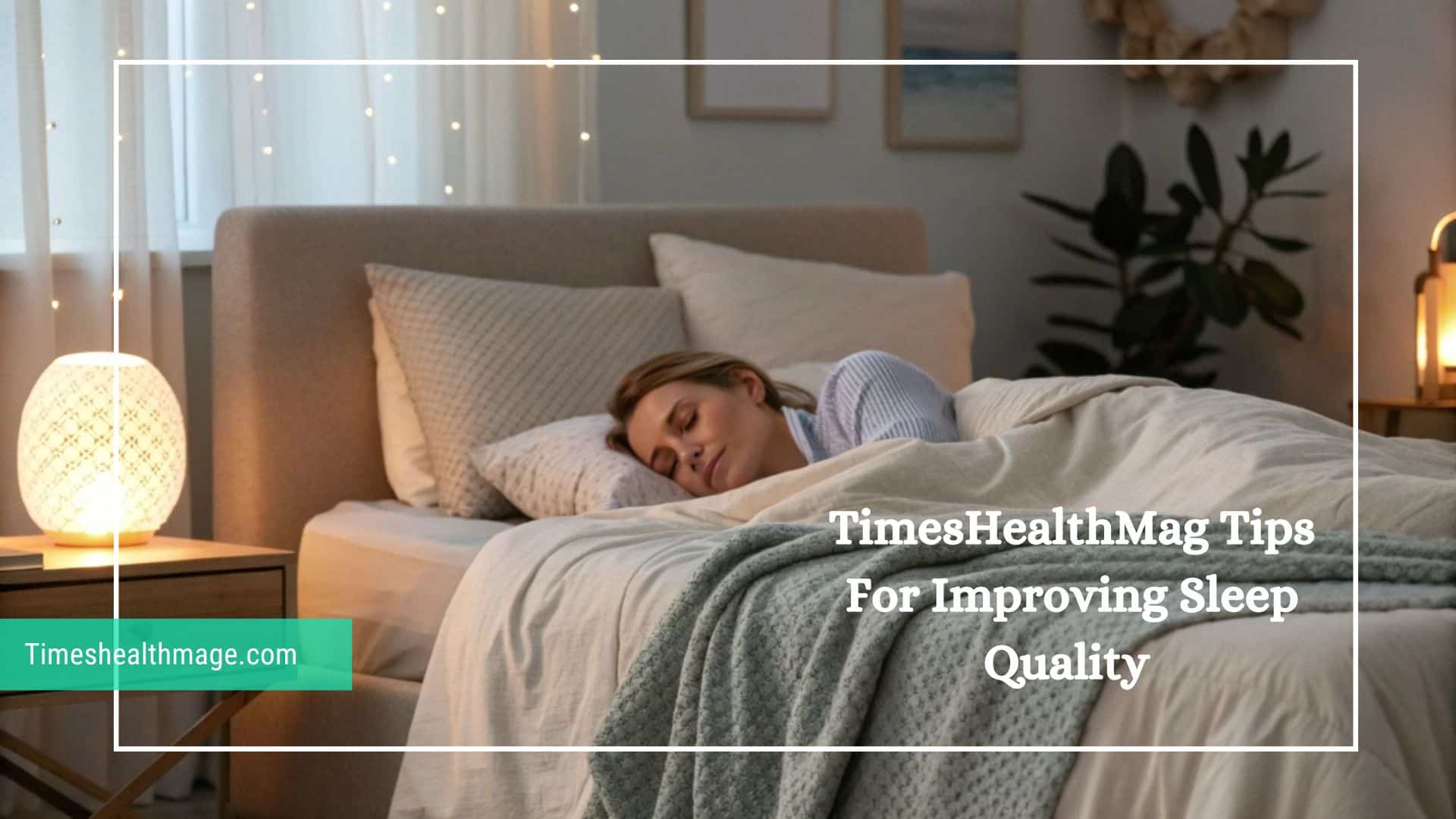Sleep is an essential part of our lives that many of us take for granted. A good night’s rest is vital for physical health, mental clarity, and emotional well-being. As we continue to live in a fast-paced world full of distractions, achieving quality sleep has become increasingly challenging. That’s why turning to trusted sources like TimesHealthMag for expert-backed tips is crucial.
Stay tuned with us, we will explore TimesHealthMag tips for improving sleep quality, breaking down practical and scientifically-backed strategies that can help you unlock a more restful, rejuvenating slumber. From environmental adjustments to lifestyle changes, you’ll find everything you need to optimize your sleep cycle.
What is TimesHealthMag?
TimesHealthMag is a reliable online platform dedicated to providing expert health and wellness advice. It covers a wide range of topics, including fitness, nutrition, mental well-being, and medical insights. The goal of TimesHealthMag is to empower readers with accurate and easy-to-understand information, helping them make informed decisions about their health.

Whether you’re looking for tips on staying active, managing stress, or improving sleep quality, TimesHealthMag offers practical and science-backed solutions to support a healthier lifestyle. It’s your go-to resource for all things health, designed to make wellness accessible to everyone.
Why Is Sleep So Important For Your Health?
Before diving into practical tips for improving sleep, it’s crucial to understand why sleep is essential for overall well-being. Sleep isn’t just about resting—it’s when your body performs vital functions such as hormone regulation, memory consolidation, cell regeneration, and immune boosting.
The quality of your sleep directly impacts your mental health, physical well-being, and overall quality of life. Poor sleep can lead to a variety of health problems, including weakened immunity, increased stress, difficulty concentrating, and even chronic conditions like hypertension, obesity, and diabetes.
What Are The Risks Of Poor Sleep?
Research shows that poor sleep has far-reaching effects on both mental and physical health. Here are some significant consequences of sleep deprivation:
- Increased Stress and Anxiety: Lack of sleep can disrupt emotional regulation, leading to heightened irritability and anxiety.
- Cognitive Decline: Chronic sleep deprivation affects brain function, leading to memory issues, difficulty concentrating, and poor decision-making.
- Weakened Immune System: Sleep is vital for immune function. Insufficient sleep makes you more susceptible to illnesses and infections.
- Weight Gain: Sleep deprivation can interfere with hormones that regulate hunger, causing overeating and contributing to weight gain.
Understanding these risks highlights the importance of following TimesHealthMag tips for improving sleep quality to prevent these health issues.
What Are TimesHealthMag Tips For Improving Sleep Quality?
To ensure that you get the restorative sleep you need, TimesHealthMag tips for improving sleep quality suggest creating a routine and making changes to your environment. Here are the most effective tips:
Stick to a Consistent Sleep Schedulel:
One of the most effective ways to improve sleep quality is by regulating your sleep-wake cycle. Going to bed and waking up at the same time every day— even on weekends—helps your body’s internal clock remain consistent. This routine reinforces the natural circadian rhythm, making it easier to fall asleep and wake up at the right times.
Why It Works:
A consistent sleep schedule reduces the confusion your body experiences from inconsistent sleep patterns. When you go to bed and wake up at the same time, your body learns to fall asleep more easily and wake up refreshed.
Create an Optimal Sleep Environment:
The environment where you sleep plays a crucial role in your sleep quality. Aim for a cool, dark, and quiet room to promote deeper sleep.
Key Environmental Factors to Focus On:
- Temperature: Keep the bedroom temperature between 60-67°F (15-20°C) for optimal sleep.
- Lighting: Use blackout curtains or an eye mask to eliminate light, which can interfere with melatonin production.
- Noise: If you live in a noisy area, consider using earplugs or a white noise machine to block out disruptions.
Why It Works:
A calm and comfortable sleep environment tells your brain that it’s time to rest. Darkness signals to the brain that it’s nighttime, while cool temperatures help lower your body temperature, which is essential for initiating sleep.
Limit Screen Time Before Bed:
In the digital age, screens are a significant part of our lives. However, using electronic devices like smartphones, tablets, or computers before bed can be detrimental to your sleep quality.
Why It Affects Sleep:
The blue light emitted by screens interferes with the production of melatonin, the hormone responsible for regulating sleep. This disruption makes it harder for your body to transition into sleep mode.
Tip:Avoid screen time for at least an hour before going to bed. If you must use a device, consider using blue light filters or wearing blue light-blocking glasses.
Develop a Relaxing Bedtime Routine:
A calming pre-sleep routine signals to your brain that it’s time to wind down. Engage in activities that promote relaxation and prepare your body for sleep.

Relaxing Activities to Try:
- Reading: Choose a calming book or a light novel.
- Meditation: Practice mindfulness or deep-breathing exercises.
- Gentle Stretching: Yoga or stretching can help relieve muscle tension.
- Warm Bath: Taking a warm bath before bed can lower your core body temperature and help you feel sleepy.
Why It Works:
Relaxation activities reduce stress and promote a sense of calm, preparing your mind and body for deep rest. By establishing a routine, your body begins to associate these activities with sleep, making it easier to unwind each night.
Manage Naps Carefully:
While napping can be beneficial, too much daytime sleep or late-afternoon naps can disrupt your nighttime sleep.
Ideal Nap Duration:
Limit naps to about 20 minutes, and avoid napping after 3 p.m. This short power nap can refresh you without interfering with your sleep cycle.
Why It Works:
Napping too long or too late in the day can make it harder to fall asleep at night. A short nap, however, helps boost energy levels without affecting your nighttime sleep.
Watch Your Diet and Caffeine Intake:
What you eat and drink can significantly impact your sleep quality. Avoid heavy meals, caffeine, and alcohol close to bedtime.
Foods and Drinks to Avoid:
- Caffeine: Coffee, tea, or energy drinks, especially in the late afternoon or evening, can stay in your system for hours, keeping you awake.
- Heavy Meals: Eating large or rich meals before bed can cause discomfort and indigestion, making it harder to fall asleep.
- Alcohol: Although alcohol may make you feel sleepy initially, it can disrupt sleep patterns and lead to poor-quality rest.
Why It Works:
Caffeine and alcohol interfere with the natural sleep cycle, and heavy meals can cause discomfort that prevents you from falling into a restful sleep.
Exercise Regularly, But Not Too Close to Bedtime:
Regular physical activity improves sleep quality by promoting deep, restorative sleep. However, vigorous exercise just before bed can elevate adrenaline and body temperature, making it difficult to fall asleep.
Ideal Timing for Exercise:
Aim to finish vigorous exercise at least 3-4 hours before bedtime. Gentle activities like walking or stretching can be done closer to bedtime.
Why It Works:
Exercise helps reduce stress and anxiety while promoting deeper sleep. However, timing is crucial—too close to bedtime, and it may have the opposite effect.
Reduce Stress and Anxiety:
Managing stress is a critical component of improving sleep quality. Stress and anxiety can keep your mind racing and prevent you from falling asleep.
Stress Management Techniques:
- Journaling: Write down your thoughts and worries before bed to clear your mind.
- Relaxation: Practice progressive muscle relaxation or breathing techniques to calm your body.
- Mindfulness: Engage in mindful breathing exercises or visualization to focus your mind.
Why It Works:
Relaxing your body and mind before sleep helps reduce the production of cortisol (the stress hormone) and prepares your body for rest.
Get Exposure to Natural Light During the Day:
Your body’s internal clock, or circadian rhythm, is strongly influenced by light. Exposure to natural sunlight during the day helps regulate this rhythm and improves sleep quality.
Why It Works:
Natural light helps synchronize your internal clock, making it easier to fall asleep at night and wake up in the morning.
Consider Sleep Supplements (With Caution):
While not for everyone, some people find sleep supplements like melatonin helpful for improving sleep quality. However, it’s crucial to consult with a healthcare provider before using any sleep aid.
Why It Works:
Melatonin supplements can help regulate your sleep-wake cycle, particularly if you have trouble falling asleep or suffer from jet lag. However, they should only be used short-term and under professional supervision.
Common Sleep Disorders and How to Address Them – Effective Remedies You Need to Know!
Sleep disorders can significantly impact your health, but addressing them can improve your sleep quality. Below are some common sleep disorders and tips for managing them:
- Insomnia: Insomnia is characterized by difficulty falling or staying asleep, often caused by stress or poor sleep habits. To manage it, establish a consistent sleep schedule and practice relaxation techniques before bedtime.
- Sleep Apnea: Sleep apnea causes breathing interruptions during sleep, leading to poor sleep quality and daytime fatigue. Treatment typically involves using a CPAP machine and lifestyle changes, like weight loss or sleeping on your side.
- Restless Legs Syndrome (RLS): RLS creates an uncontrollable urge to move the legs, especially when resting. Managing RLS includes regular exercise, avoiding stimulants at night, and possibly taking prescribed medications.
- Narcolepsy: Narcolepsy causes excessive daytime sleepiness and sudden sleep attacks. Treatment involves medications and scheduled naps to help manage daytime drowsiness.
- Circadian Rhythm Disorders: Circadian rhythm disorders, such as delayed sleep phase disorder, disrupt your internal sleep-wake cycle. Treatment includes maintaining a consistent sleep schedule and using light therapy to reset your body’s internal clock.
- Parasomnias (Sleepwalking, Night Terrors, etc.): Parasomnias include sleepwalking and night terrors, often occurring during deep sleep. Addressing this involves improving sleep hygiene, managing stress, and ensuring a safe sleeping environment.
How Does Mental Health Impact Sleep Quality?
Mental health plays a crucial role in sleep quality, with disorders like anxiety and depression often leading to sleep disturbances. When mental health issues are left unaddressed, they can contribute to trouble falling asleep, staying asleep, or experiencing restful sleep. On the other hand, poor sleep can also worsen mental health conditions by increasing stress, anxiety, and mood fluctuations.

This creates a cycle where mental health issues and sleep problems feed into each other. By managing mental health effectively and adopting healthy sleep habits, individuals can improve both their mental well-being and sleep quality. Taking small steps, like talking to a professional or practicing relaxation, can help break this cycle and lead to better sleep.
FAQs:
Can alcohol affect my sleep quality?
Yes, while alcohol may help you fall asleep faster, it disrupts your sleep cycle later in the night. This leads to fragmented sleep, making it less restorative. It’s best to avoid alcohol at least a few hours before bed.
Is it okay to exercise before bed?
Exercising can improve sleep quality, but vigorous exercise too close to bedtime may interfere with your ability to fall asleep. If you want to exercise at night, try low-impact activities like walking or gentle stretching.
How can I improve my sleep environment?
Make sure your bedroom is cool, quiet, and dark for the best sleep. You can use blackout curtains, earplugs, or a white noise machine. Also, keep your bed for sleep only, avoiding any work or distractions there.
Why is sticking to a sleep schedule important?
A consistent sleep schedule helps regulate your body’s internal clock. It makes it easier for you to fall asleep and wake up at the right times. Consistency reinforces your circadian rhythm, promoting better sleep.
How does stress affect my sleep?
Stress triggers the production of cortisol, a hormone that keeps you awake and alert. High levels of stress can make it difficult to wind down and fall asleep. Practicing relaxation techniques like meditation can help alleviate stress before bed.
How can I track my sleep patterns?
You can use wearable devices or apps to monitor your sleep cycle and quality. These tools can provide insights into how much deep sleep you get and whether there are patterns affecting your rest. Tracking can help identify areas for improvement in your sleep habits.
Conclusion:
Getting enough quality sleep is crucial for both your physical and mental health. By following simple tips like maintaining a consistent sleep schedule, creating a calm sleep environment, and managing stress, you can significantly improve your sleep. Avoiding caffeine and alcohol close to bedtime, and limiting screen time, also play a big role in better rest. Remember, sleep is not just about resting but also about allowing your body and mind to recover.
Small changes in your routine can lead to better sleep and, ultimately, a healthier lifestyle. So, prioritize your sleep, and you’ll feel more energized and focused every day.
Also Read:


Leave a Reply